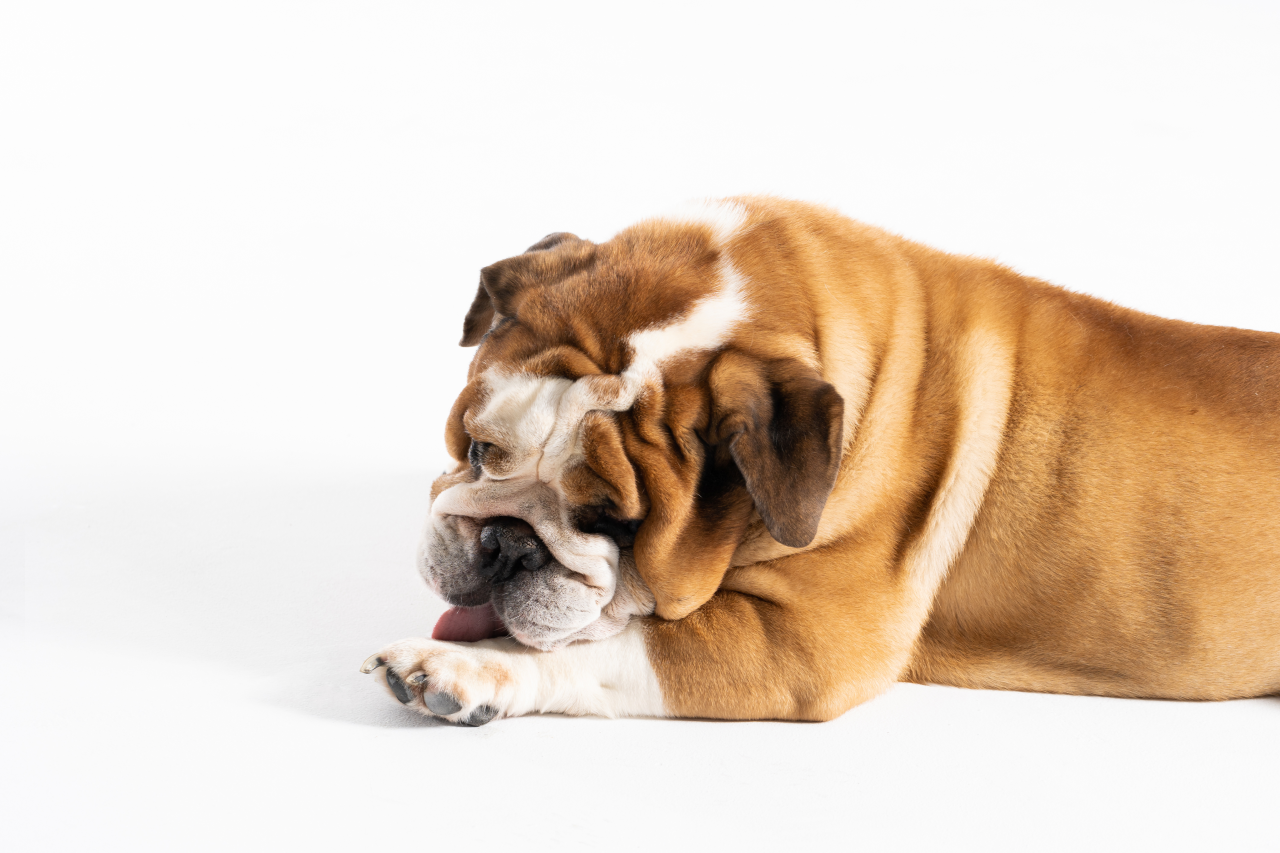
Why Dogs Lick Their Paws
If you are a dog owner, you've likely seen your fur baby engaging in various behaviors, and one of the most common and curious is paw licking.
While an occasional paw lick is normal, excessive licking can be concerning for pet parents.
In this article, we will dive into the reasons behind why dogs lick their paws and provide insight into when it might be time to seek professional advice.
1. Allergies
Environmental or contact allergies are the most common cause of paw licking. When a dog’s skin comes into contact with an allergen (such as dust, grass or pollen), then this triggers a cascade of inflammation and itch, resulting in paw licking. Food and flea allergies can also cause paw licking. If you suspect your dog is suffering from allergies, speak with your veterinarian to determine the culprit as soon as possible. Allergies cause a weakened skin barrier which can lead to inflammation and infection.
A note on food allergies: The most common food allergens for dogs are beef, dairy, chicken, wheat and lamb. Wild Earth is free from these allergens, making it a great option for food allergic dogs.
2. Infection
Whether licking is caused by allergies or something else, constant licking of the paws creates a moist environment, and you know what loves a warm, moist environment? Fungi. Malassezia is a type of yeast that is a normal inhabitant of dog skin, but if the skin becomes moist, the yeast will flourish and cause an infection that perpetuates the itch cycle. More itch leads to more licking… and the cycle continues.
How can you tell if your dog has a yeast infection in their paws? Usually the paws will become a reddish brown color. If you suspect that your dog does have a yeast infection, it is important to see your veterinarian to address the infection and stop the cycle.
3. Parasites
Parasites such as ticks, sarcoptic mange mites or demodex mites love to bury into the warm crevices between the toes. This creates itch and irritation, causing your dog to lick their paws. It is important to make sure that you are using year-round prescription parasite prevention recommended by your veterinarian.
4. Injury
Just like humans, dogs can experience discomfort in their paws. Excessive licking might indicate that something is bothering them such as an injury. If your dog licks a specific paw repeatedly or exhibits signs of pain during or after licking, it's essential to inspect their paws gently and, if necessary, seek veterinary attention.
5. Foreign Body
Dogs don’t wear shoes (well most don't) and therefore can easily step on a rock, stick, grass awn, or really anything that can get lodged between their toes. Grass awns are a problem particularly in the summer as they easily pierce the skin’s surface. These tiny dart-like awns migrate inside the skin and cause irritation which leads to chewing and licking.
Just like an injury, this typically results in licking a specific paw. If you notice your dog is highly focused on a paw, make sure to examine the paw, looking for bumps or blisters. If you do see one, it could mean a grass awn is the culprit and it is important to take your dog to their veterinarian immediately so that it can be removed before it travels even further.
6. Irritation
Many household cleaning products including bleach and carpet cleaner can irritate the skin on the paws, and this irritation can cause your dog to lick their paws. Make sure to avoid letting your dog step on wet floor that has just been cleaned, and steer clear of sprinkle-on carpet cleaners. If you suspect that your dog is licking their paws because they have come into contact with an irritant, it is best to wash the paws with warm water and a mild soap.
7. Pain
Joint pain and arthritis can cause a dog to lick the affected area. If you notice paw licking along with behavior such as limping, then take your dog to their veterinarian to be evaluated as they may need medication to alleviate their pain.
Remember never to give your dog any over the counter pain medications such as Tylenol or aspirin as these can be toxic to dogs.
8. Behavioral
In some cases, dogs may lick their paws out of boredom or habit. If they have nothing else to do or are seeking attention, they may resort to licking their paws as a way to pass the time. While this behavior is generally harmless, it's crucial to provide them with sufficient mental and physical stimulation to prevent it from becoming a compulsive habit.
Monitor Your Dog Closely
Paw licking, while often natural and benign, can sometimes be a sign of an underlying issue that requires attention. As a responsible pet owner, it's crucial to monitor your dog's behavior closely and take note of any changes in their licking habits.
If your dog's paw licking seems excessive, causes visible discomfort, or is accompanied by other concerning symptoms, it's best to consult a veterinarian. A professional evaluation will help determine the root cause and ensure your beloved companion receives the appropriate care and treatment.
Remember, understanding your dog's behavior is vital for maintaining their health and happiness, and being attentive to their needs will strengthen the bond between you and your furry friend.



























